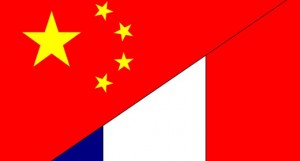
 Chinese president Xi Jiping , wearing oversize headphones, appeared on the cover of the French weekly Nouvel Obs on Dec. 4. “Are they spying on us?” asked the magazine.
Chinese president Xi Jiping , wearing oversize headphones, appeared on the cover of the French weekly Nouvel Obs on Dec. 4. “Are they spying on us?” asked the magazine.
The same week, huge parabolic antennae showed up on the roof of an inconspicuous building four miles from Paris.
Some people found the picture rather amusing and did not take this disclosure too seriously. But not everybody. In fact, the way China is making inroads into the French economy is somewhat disturbing for many.
This week, the International Monetary Fund announced that China surpassed the US as the largest economy in the world. The sheer size of this sub-continent, which represents over one fifth of the world population, is rather frightening for a small country like France. The economic strategy of China starts with the creation of partnerships with foreign companies, then a growing participation in their capital, and finally their acquisition. It is by absorbing the ideas, the know-how and the technology of older countries, that China was able to race to the number one slot. French officials and heads of private companies facilitate China’s grand design.
Economic relationships between the two countries have existed for years, but what is new is its accelerating pace. In 2007, China had no high-speed trains. Then it turned to France (Alstom), Germany (Siemens) and Japan ( Shinkansen) to obtain the transfer of their technologies. Today China has the longest fast train network in the world.
In 1992, Donfeng Motor Corporation and Peugeot-Citroen, the leading carmaker in France entered in a joint venture and started manufacturing cars in China.
In March 2014, China Donfeng became an equal share holder of Peugeot-Citroen, thereby bringing to an end the 200-year-old family dynasty.
France sold the idea of Club Med and the Shanghai-based Fosun company is currently fighting to win a bid for its acquisition.
For the French, it feels like selling the family jewels when they see their prestigious wines of Bordeaux or Burgundy, along with their chateaux, being bought by the Chinese.
But the most unsettling development so far just took place on Dec. 4. Emmanuel Macron, Minister of the Economy, signed an agreement with a Chinese consortium granting it 49.99 percent of the capital of the Toulouse airport.
It is a disastrous business move by the French government. Toulouse is the country’s fourth largest airport. Extensive work has just been completed at a high cost. The airport has been a money-making undertaking, so why sell it for a dismal 308 million – the price of one Airbus?
The answer is simple: France is under extraordinary pressure from Brussels to lower its deficit. It needs money.
The new giant facility will handle 20 million passengers a year, multiplying by five the number of Chinese tourists visiting France, with direct flights to several Chinese provinces. Anybody, who has ever been to the “pink city” (pink is the color of the stone) on the banks of the Garonne with its quaint historical districts, will feel shocked by this decision.
Besides, Toulouse is the European capital of aeronautics as well as an important center of nuclear and spatial research. A large Chinese presence in the neighborhood understandably makes some people nervous.

About the author: Nicole Prévost Logan divides her time between Essex and Paris, spending summers in the former and winters in the latter. She writes a regular column for us from her Paris home where her topics will include politics, economy, social unrest — mostly in France — but also in other European countries. She also covers a variety of art exhibits and the performing arts in Europe. Logan is the author of ‘Forever on the Road: A Franco-American Family’s Thirty Years in the Foreign Service,’ an autobiography of her life as the wife of an overseas diplomat, who lived in 10 foreign countries on three continents. Her experiences during her foreign service life included being in Lebanon when civil war erupted, excavating a medieval city in Moscow and spending a week under house arrest in Guinea.